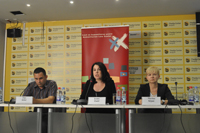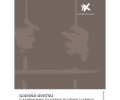The Negative Impact the Court of Appeal Judgment in the Skočić Case will Have on War Crimes Trials in Serbia

With regard to the judgment rendered by the Court of Appeal in Belgrade in the case of the crime committed in July 1992 in the town of Skočić near Zvornik, the Humanitarian Law Center (HLC) held a press conference on July 6th, 2018. When deciding upon the appeal, the Court of Appeal in Belgrade upheld the acquittal of members of the „Sima’s Chetniks“ unit for the destruction of a mosque and murder of 27 Roma civilians committed in the village of Skočić in July 1992, but modified the judgment in the case of the accused Zoran Alić, Zoran Đurđević and Tomislav Gavrić, finding them guilty of inhumane treatment, violation of physical integrity, sexual humiliation and rape of protected witnesses.
Ivana Žanić, Coordinator of the HLC Legal Team, warned that this judgment rendered by the Court of Appeal contains serious faults, which will have a great impact on future war crimes trials in Serbia. Ms. Žanić underlined that, according to the judgment rendered by the Higher Court in Belgrade, the „Sima’s Chetniks“ unit, which comprised volunteers from Serbia and operated in the Zvornik Municipality from April 1992, was responsible for the crime committed in Skočić. The HLC filed a criminal complaint in 2008 with the Office of the War Crimes Prosecutor (OWCP) concerning the crime committed in Skočić. It was only two years later that the OWCP filed an indictment against members of „Sima’s Chetniks“ for the destruction of the town mosque, murder of 27 Roma civilians and inhumane treatment of three protected witnesses. Explaining the course of the judicial proceedings, Ms. Žanić stated that the first first-instance judgment found all of the accused guilty. The Court of Appeal in Belgrade then quashed this judgment in 2014, and the proceedings started again from the beginning. The second first-instance judgment rendered by the Higher Court in Belgrade in 2015 acquitted all of the accused, due to the lack of evidence. The Court of Appeal, by its newest judgment rendered in June 2018, confirmed that the accused are not guilty of the destruction of the town mosque and the murder of the Roma civilians, whereas three of the accused (Tomislav Gavrić, Zoran Đurđević and Zoran Alić) were convicted for inhumane treatment of three witnesses – rape, sexual humiliation and abuse.
Ms. Žanić singled one thing out as the sole positive example from the judgment of the Court of Appeal in question, and that is the fact that the court established that three members of the „Sima’s Chetniks“ unit subjected three women – protected witnesses, two of whom were juvenile at the time of the event – to inhumane treatment. Namely, the Court established that these women were under the power of this unit for several months, did not have any control over their own lives, were raped several times a day every day, were sexually humiliated and forced to cook and clean the houses in which members of this unit resided. The court also established that the accused had been aware that by their actions they had inflicted suffering and humiliation on these women and that this was exactly their aim.
The legal representative of the injured party Zijo Ribić, Ms. Marina Kljaić, underlined that the judgement rendered by the Court of Appeals is unsustainable for a number of reasons. First of all, it is based on a rigid interpretation of the legal provisions regulating the notion of co-perpetration. By this judgment, the Court of Appeal has imposed a disproportionate burden of proof for the existence of co-perpetration in cases in which a group of people in a certain time period commits a great number of crimes. Referring to the existing practice of the courts in Serbia, Ms. Kljaić stated that in earlier cases it had been enough to prove that a certain member of the unit operated as part of the unit and that he had consented to the act of perpetration of each of the members of the group, thereby accepting the act as his own. The Court of Appeal has changed this standard by this judgment, establishing that it is necessary to prove each of the acts of perpetration by each member of the group. By such an interpretation, the court has imposed a disproportionate and not easily satisfied standard of proof before the OWCP. Second, the Court of Appeal offered an inadequate interpretation of the provision relating to aggravating and mitigating circumstances. So, when deciding on the punishment in the case of the accused Zoran Đurđević, the Court did not take into account as an aggravating circumstance the fact that he had already been found guilty of committing a crime against the civilian population in June 1992 in Bijeljina. In addition to this, the Court of Appeal was not consistent in the determination of punishments, since it sentenced Đurđević to 13 years of imprisonment for the commission of rape and sexual abuse of two women in Bijeljina. However, for the rape and sexual abuse of the protected witnesses in Skočić, which lasted continuously for several months, the court sentenced Zoran Đurđević to 10 years of imprisonment, thus implying, Ms. Kljaić underlined, that for a domestic court the rape of Roma women is more acceptable and less important.
Zijo Ribić, who survived the execution of his family by members of „Sima’s Chetniks“ as an eight-year-old, stated that he had enjoyed the support of the HLC from the beginning of the trial and that he had believed that the persons responsible for the murder of his parents, sisters and brothers would be convicted. When members of this unit were convicted by the first first-instance judgment, he believed the right thing had happened; however, the newest judgment left him speechless. In his opinion, the courts in Serbia have sent a clear message that the lives of Roma people have no value – that Roma are not people and that no one should be held accountable for the murder of Roma people.
The HLC will file a constitutional appeal within the legal deadline because of the violation of the right to a fair trial in the part of the judgment covering the destruction of the mosque and the murder of the Roma civilians.
The HLC has also published a press release concerning this judgment, which is available here.







